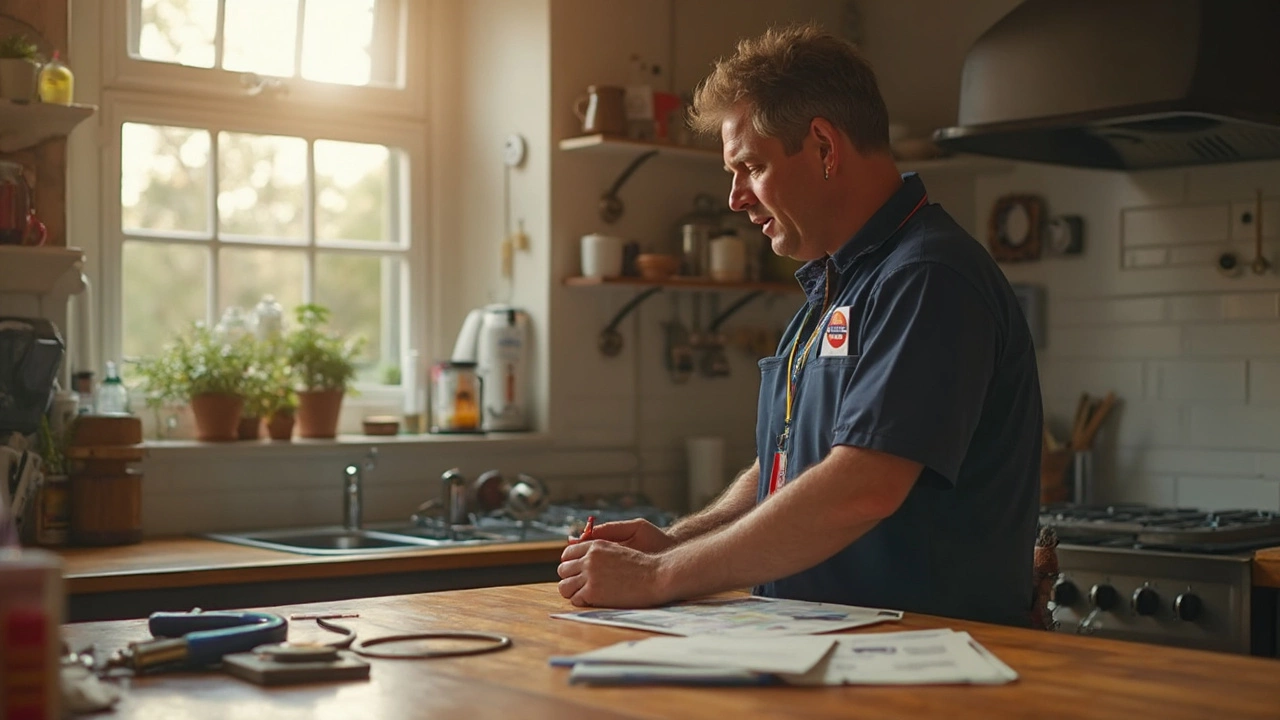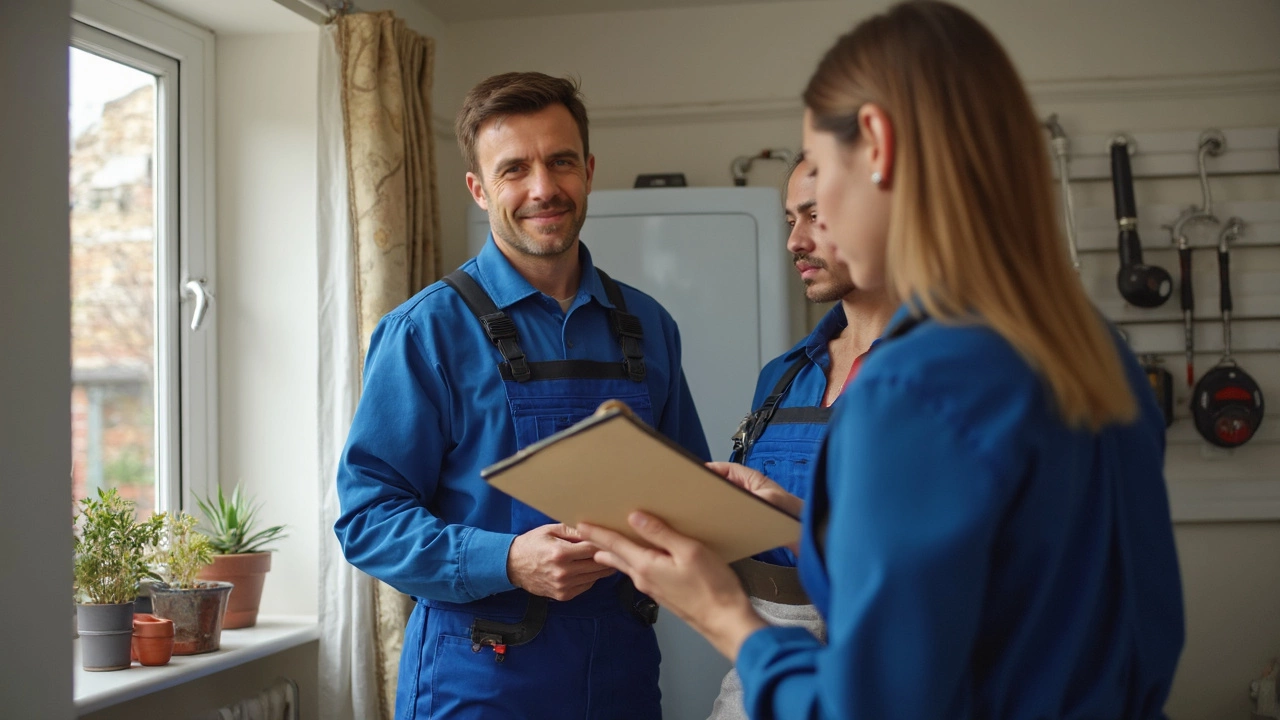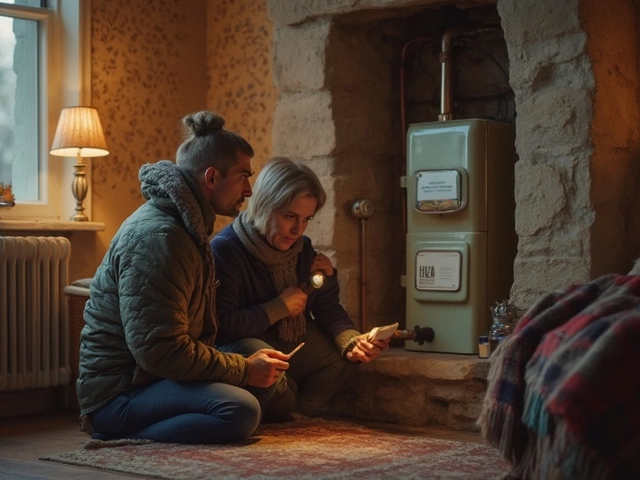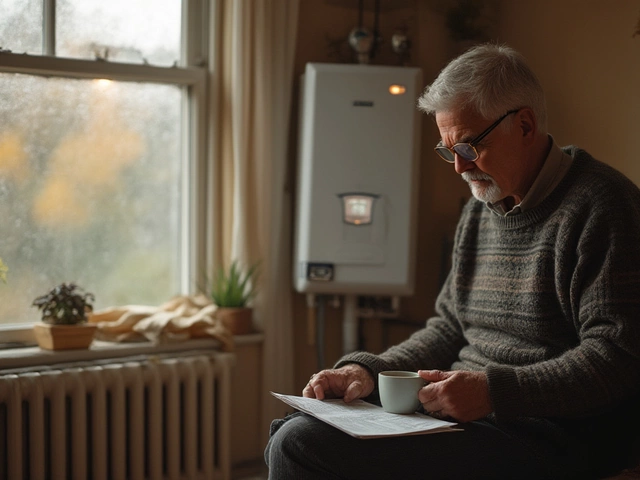You might be standing in your kitchen staring at that clunky old boiler, wondering if it’s about to give up the ghost. Maybe the radiators are cold again, or your shower’s decided lukewarm is the new hot. It’s easy to feel stuck—plumber, heating engineer, gas engineer, or a friend who 'did plumbing once'? Who do you actually call to change a boiler? Here’s where things get clearer, and probably a little surprising.
What Exactly Do Plumbers Do? (And Where Do Boilers Fit In?)
When most people hear “plumber,” they think of the person who wrangles leaky pipes, unblocks the kitchen drain, or replaces that monster of a bathroom tap. But in the UK—and in many other countries—the word “plumber” covers a much bigger world. Plumbing is about any system that moves water, gas, or even waste around your home. That simple idea branches out into all kinds of specialised work.
So, can plumbers change boilers? Depends on their training and certifications. Every boiler (especially gas ones) needs a qualified installer. In the UK, that means being Gas Safe registered. A lot of plumbers are, especially those who focus on heating rather than just pipes and bathrooms. But not every plumber is a boiler installer by default.
Here’s the thing: Plumbers might handle all the water-related side of your heating system, but for gas boilers, they need proof they can work safely with gas. The same goes for oil or LPG boilers—different safety rules, different badges of accreditation. Also, in some places, the term 'heating engineer' or 'boiler engineer' is more common, but many of these engineers started out as plumbers and then got extra training.
You can always check if someone is Gas Safe registered in the UK by searching their ID number or company name at the official Gas Safe Register online. Don’t just trust someone because they’re friendly or came recommended. Shocking fact: research from Which? magazine found in 2024 that more than 1 in 10 boiler installations it inspected had safety faults, often because installers weren’t fully qualified.
If your boiler is electric, you won't need a gas specialist, but you do still want an installer with proper credentials for heavy-duty electrics. It’s not worth risking an unsafe installation—damage, fire, and carbon monoxide leaks aren’t worth saving a few quid.
Here’s a key tip: Ask anyone working on your boiler about their specific qualifications, not just their job title. This might be the most important question you can ask, and a real pro won’t be offended—they’ll be proud to show you their credentials. Getting it wrong can mean more than a cold shower; it can be dangerous. According to the Health and Safety Executive (HSE) in 2023, most accidents with domestic boilers were due to unqualified work or skipped safety checks.
So, while many plumbers do change boilers (especially if they have Gas Safe accreditation), just having 'plumber' on their van or website isn’t a guarantee. That’s not to say there aren’t thousands of brilliant multitasking plumbers out there. Just look under their job title before you book.

Boiler Installation: The Differences Between a Plumber and a Heating Engineer
Let’s get real: job titles in the trade world can be slippery. Some will tell you, 'You want a heating engineer for that.' Others, 'I’ve been a plumber for 30 years, I do boilers every day.' So, what’s the difference?
Traditionally, a plumber focuses on water, drains, tanks, and piping. A heating engineer leans into everything related to central heating systems—boilers, underfloor heating, radiators, controls, pumps, and so on. The lines blur, especially as courses and regulations change. In fact, most heating engineers start their careers as plumbers. Over time, they do extra courses to cover gas, heating controls, and safety systems.
But here’s a solid fact: No matter what someone calls themselves, if they’re installing, repairing, or even just checking a gas, oil, or LPG boiler, they must show you an up-to-date Gas Safe ID (or OFTEC for oil) in the UK. It should have a picture, expiry date, and list the types of appliances they’re qualified to work on. For electric boilers, the rules are different—choose someone registered with either NICEIC or another competent person scheme.
The job isn’t just about swapping boxes. A new boiler installation means disconnecting the old system, checking flues and vents, balancing the heating system, cleaning out old sludge, possibly upgrading the thermostat, fitting safety valves, and registering the work for building control compliance. That's a fancy way of saying someone must tell the local authorities it was all done by the book. If your installer doesn’t do this, your warranty could be void—and if you sell your house, the missing paperwork could cause big headaches.
Here’s a stat that’ll shock you: A 2024 survey by Boiler Guide showed that 64% of homeowners had no idea a boiler installation needs to be officially registered. Don’t be caught out; always ask for this paperwork as part of the job.
Now, what about guarantees? Most manufacturers won’t honour their warranty unless their boiler is installed by someone they recognise as competent and qualified. Make sure you keep all paperwork, and ask for the 'Benchmark' checklist, which proves the install was signed off properly. This could save you hundreds, maybe even thousands, if something goes wrong within the warranty period.
Boilers aren’t just big kettles. They’re complicated, potentially dangerous machines. Even small mistakes—like getting the wrong pipe size or skipping a system flush—can shorten its life or cause noisy, unreliable heating.
Want to see what to look for? Here’s a cheat sheet:
- Does the installer show you their Gas Safe (or OFTEC, NICEIC) card without a fuss?
- Are they happy to explain exactly what’s getting done, and give a written quote?
- Will they handle the registration and provide all paperwork and safety certificates?
- Are reviews or recommendations recent and positive?
- Do they offer a guarantee on their own labour as well as the manufacturer’s warranty?
Check these five points and you’ll avoid most of the horror stories you hear online.

What to Consider Before Getting Your Boiler Changed
Sick of rising bills, unreliable heating, or constant repairs? Maybe you’re eyeing up a shiny new combi boiler, or switching from oil to gas, or just trying to cut your carbon footprint. Either way, picking the right pro is step one, but there’s a laundry list of things to know before you hit 'replace.'
First up, think about timing. Most people only bother with boiler replacement in the dead of winter, when it’s already broken—not smart. Book installers out of season (late spring and summer) and you’ll get better prices and quicker service. If your boiler is over 12-15 years old, or your radiators never get properly hot even after a flush, start researching now, not after it fails. According to the Energy Saving Trust, swapping an old G-rated boiler for a new A-rated one could save up to £540 a year (2024 figures) on energy bills. That’s not nothing.
Now, let’s look at the options. Do you want a straightforward replacement—same type, same spot? Or is this the time to rethink everything? Some homes are switching to heat pumps, but for most UK houses, a high-efficiency condensing boiler remains the top choice, especially if space and existing pipework are limited. If you’re tempted by ultra-modern smart controls, zoned heating, or improved water pressure, tell your installer upfront. Changes might mean new pipe runs, bigger tanks, or extra valves.
Here’s a quick look at the costs and potential savings, as found in a 2025 HomeServe survey:
| Boiler Type | Typical Replacement Cost (2025) | Annual Savings (if upgrading old model) |
|---|---|---|
| Combi Boiler | £1,800 - £2,400 | £340 |
| System Boiler | £2,200 - £2,800 | £480 |
| Conventional Boiler | £2,500 - £3,500 | £540 |
Want it done fast? The average install takes 1-3 days, provided nothing unusual turns up (ancient pipework, hidden leaks, asbestos, or an awkward flue route can slow things down). Some firms claim to fit a new combi in a day, but that’s usually just a like-for-like swap with no surprises.
Now, a hot tip: always get more than one quote. Prices swing wildly, even in the same postcode. Aim for three, but make sure you’re comparing on the same level—ask exactly what’s included. Cheapest isn’t always best. Look for clear warranties, thorough flushes, and good aftercare. Boiler install horror stories usually start with ‘I just went with the cheapest...’
If you’re replacing an ancient model, consider system extras like a magnetic filter, smart thermostat, or scale reducer. Small upfront costs here can add years to your new boiler’s life. And don’t forget your radiators—clogged rads mean your expensive new boiler works harder than it should.
Boiler grants and subsidies are big news, especially for older or low-income households. In 2025, the UK’s Boiler Upgrade Scheme and ECO4 grants can knock hundreds off the upfront price, often covering extra insulation too. Always ask your installer what’s available, and check local authority schemes as well.
A final word from the heating trade—here’s what the Chartered Institute of Plumbing and Heating Engineering (CIPHE) recommends:
"Consumers should always check an installer’s identity and registration status before any work starts. Avoiding cowboy installers is as simple as spending two minutes checking credentials."Sound advice.
So, back to that original question: Do plumbers change boilers? The short answer is yes—if they’re properly qualified, and often they do the job brilliantly. But just because someone’s a plumber doesn’t mean they’ve got what’s needed to keep you safe and warm. So, pull up their credentials, ask the awkward questions, and watch out for those who talk fast but skip the safety details. You’ll end up with a better, safer job—and maybe even a working shower in winter this time.





